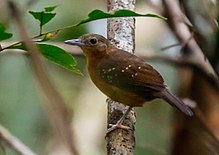Humaita antbird
Jump to navigation
Jump to search
| Humaita antbird | |
|---|---|

| |
| male at Careiro, Amazonas state, Brazil | |

| |
| female at Careiro, Amazonas state, Brazil | |
| Scientific classification | |
| Domain: | Eukaryota |
| Kingdom: | Animalia |
| Phylum: | Chordata |
| Class: | Aves |
| Order: | Passeriformes |
| Family: | Thamnophilidae |
| Genus: | Myrmelastes |
| Species: | M. humaythae
|
| Binomial name | |
| Myrmelastes humaythae (Hellmayr, 1907)
| |

| |
| Synonyms | |
| |
The Humaita antbird (Myrmelastes humaythae) is a species of passerine bird in the family Thamnophilidae. It is found in humid forest in the south-western Amazon in Brazil and Bolivia.
Until recently, the Humaita antbird was considered a subspecies of the spot-winged antbird. A 2007 study of the vocal characteristics found significant differences between the taxa and based on this evidence the Humaita antbird was promoted to species status.[2][3][4] As presently defined, the Humaita antbird is monotypic.[3]
The conservation status of the Humaita antbird has been assessed by BirdLife International to be of Least Concern.[1]
References
- ^ a b BirdLife International (2016). "Myrmelastes humaythae". IUCN Red List of Threatened Species. 2016: e.T22736158A95125459. doi:10.2305/IUCN.UK.2016-3.RLTS.T22736158A95125459.en. Retrieved 11 November 2021.
- ^ Isler, M.L.; Isler, P.R.; Whitney, B.M.; Zimmer, K.J. (2007). "Species limits in the "Schistocichla" complex of Percnosticla antbirds (Passeriformes: Thamnophilidae)". Wilson Journal of Ornithology. 119 (1): 53–70. doi:10.1676/05-121.1. S2CID 84340283.
- ^ a b Gill, Frank; Donsker, David, eds. (2017). "Antbirds". World Bird List Version 8.1. International Ornithologists' Union. Retrieved 2 February 2018.
- ^ "Proposal (301): Elevate subspecies humaythae, brunneiceps, and rufifacies (within Schistocichla leucostigma) to species rank". South American Classification Committee of the American Ornithological Society. 2006. Retrieved 31 January 2018.
Categories:
- Articles with short description
- Short description matches Wikidata
- IUCN Red List least concern species
- Articles with 'species' microformats
- Taxonbars with automatically added original combinations
- Taxonbars without secondary Wikidata taxon IDs
- Myrmelastes
- Birds of the Brazilian Amazon
- Birds described in 1907
- All stub articles
- Thamnophilidae stubs
